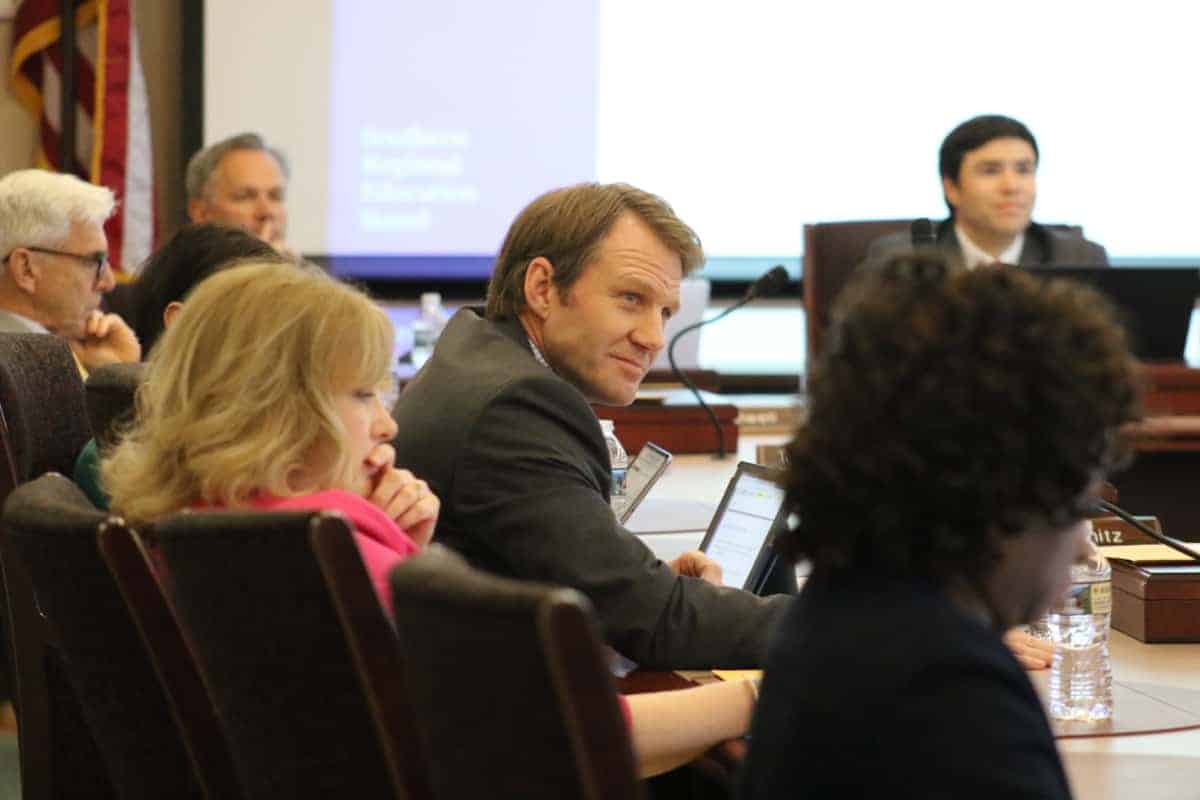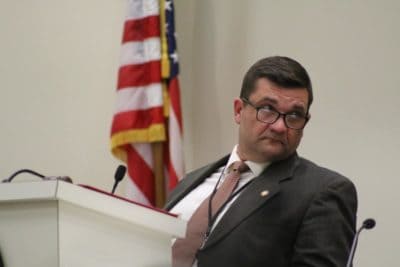After Superintendent of Public Instruction Mark Johnson backed a bill Wednesday that would shift money from school districts to give teachers $400 each for classroom supply needs, several State Board of Education members expressed issues Thursday with the bill’s potential consequences for districts.
Both teacher advisors on the board, 2017 Teacher of the Year Lisa Godwin and 2018 Teacher of the Year Freebird McKinney, were vocal Wednesday about their opposition to Senate Bill 580, saying the reallocation of the money would take away resources districts need to buy supplies and equipment in bulk. Thursday, board member Jill Camnitz said she agrees with the advisors’ sentiments.
“I don’t think any of us argue about the need for teachers to have more supportive resources for supplies in our state budget … but I think doing it by taking the money away from the LEAs is in grave danger of backfiring and not accomplishing what it sets out to accomplish,” Camnitz said. “Because I think there’s an awful lot of uses that the LEAs make of those resources that affect teachers directly in the classroom.”
Board members Patricia Willoughby and James Ford also said they support funding for classroom materials but do not think the bill’s approach is the right way to fund those funds. Willoughby said funding for instructional materials has been cut in half since 2008. According to data from the Department of Public Instruction, the instructional supplies allotment per student in 2008 was $58.77, and was $30.12 in 2017-18, which is a 49 percent decrease.
“That’s getting worse for teachers, and this is not the fix,” Willoughby said. She later compared the bill’s strategy to “robbing Peter to pay Paul.”
Johnson said he did not appreciate members jumping to negative conclusions and that he still supports giving the funds directly to teachers through the ClassWallet app. He said he is working with legislative leaders during budget negotiations for more district funding.
“I think there’s been a lot of misinformation about this bill put out there. I think $400 for every teacher’s a good thing and that’s why this bill is doing that,” Johnson said. “It is using money that already goes to districts because it is not tied to the budget. While this bill is moving through the House and the Senate, there are also budget negotiations going on which I am a part of.”
Godwin apologized about her absence from Wednesday’s press conference but said she let the bill’s advocates know she would not be supporting the bill the night before.
“I advocated all last year and into this year for there to be an increase in funding and that’s what I thought I was getting,” Godwin said. “I thought they had listened, and they didn’t. And so when I realized it wasn’t what I thought it was, I did step away.”
She said she is concerned teachers will think they are being given additional money for classroom supplies.
“It’s all in the hook,” Godwin said. “And I’m very fearful that our teachers are going to read the headline that teachers are going to be given $400. That hook makes it sound as if it’s new money and it’s over and beyond what they already get. I was hooked at first and then I did more research and realized that it was just a reallocation of funding.”
Tabari Wallace, 2018 Principal of the Year, said individual teachers will not have the ability to bargain for cheaper prices for certain supplies that central administrators do.
“That needs to be considered because once it goes individually out, you don’t have that collective bargaining power to be able to bring those prices down,” Wallace said.
Johnson said he expects the launch of the Teacher Classroom Supply Program to be “a bumpy start.” He said different teachers need different levels of funding.
“We do not have the luxury right now of knowing what those numbers are, but this tool, this app, is going to give us that information,” Johnson said. “By seeing what teachers go and spend their money on, we’ll be able to know directly what the needs are in the classroom.”
Willoughby said varying perspectives from Board members and advisors could have been helpful in the policy’s formation.
“A lot of times we make better decisions when we talk about things collectively before something just gets rolled out,” she said.
Johnson responded that he never said the board supported the policy.
“It’s a shame that people just jump to conclusions, and I know it’s a part of what happens in Raleigh, but I trust that we’ll be having a different conversation come this summer,” he said.
Board Chair Eric Davis said the conversation has revealed the needs of both districts and teachers.
“I’m grateful for our legislators who have now shined a clear light on the desperate needs of our teachers and districts in this area,” Davis said. “If nothing else, that’s what this bill has done — it’s exposed how our districts are starving for resources all the way down to our teachers.”
Another tense moment came when Johnson was asked about the lack of student advisors on the board. He said he is planning to appoint two student advisors in time for next school year. In past years, the governor has had the responsibility of appointing them. The superintendent was given that power instead in legislation that caused a lawsuit between the Board and the state/Johnson.
As the lawsuit played out, Johnson said the restraining order on the law prevented him from appointing student advisors. He said he was starting the process of searching for students last summer when a hostile board meeting in the fall caused him to stop. Now that the board has more of a collaborative nature, Johnson said he is starting that process again.
In the spirit of collaboration, Davis announced that he, Vice Chair Alan Duncan, and Johnson have committed to biweekly meetings.
“I think this is a great way to promote dialogue and collaboration between the three of us that we hope will influence not only the rest of the board but also staff here in a very positive way,” Davis said.
Out-of-state teacher licensure
After a couple months of debating the requirements for out-of-state teachers coming into North Carolina, the board approved recommendations from the Professional Educator Preparation and Standards Commission (PEPSC) Thursday.
The new requirements accept teachers’ licenses from other states with three or more years of experience who pass a comparable exam to North Carolina’s. That comparability was an issue during past discussions, with some board members concerned that if other state’s standards were lower than North Carolina’s, the quality of teachers would decrease.
The comparability in the new policy is defined as the exam satisfying a component of the licensing process in that state and the teacher scoring at least the passing score or range of scores set by the test developer instead of that specific state.
Board member Olivia Oxendine said this policy is clearer than monitoring out-of-state teachers’ EVAAS data as they begin teaching in North Carolina, which was one idea discussed by members worried about the quality of teachers coming into the state.
“We got that piece off the table and went back to something very simple,” Oxendine said.
Under the new policy, an initial professional license can be granted to teachers who meet at least one of the following:
- The completion of an in-state educator preparation program with a recommendation for licensure from that program.
- The attainment of a residency license with a recommendation for a professional license from the educator preparation program.
- The attainment of a clear license from another state with three or more years of teaching.
- The completion of an educator preparation program from another state or, if licensed, the completion of less than three years of teaching.
Out-of-state teachers with three or more years of teaching experience can convert the initial professional license into a continuing professional license by providing evaluation data from that state, including student growth. However, it doesn’t matter what that evaluation data shows; it just needs to be provided.
“For an out-of-state teacher with less than three years of experience, they may be granted an IPL (initial professional license) and may convert the IPL to a CPL (continuing professional license) by passing all SBE-required licensure exams,” says the policy on the board’s website (italics added).
Oxendine said she is confident the policy will uphold the quality of the state’s teacher workforce.
“I never had any reservations about it, but it had to go through a lot of the back and forth and back to PEPSC, and I think the result of all the discussion that continued … it’s a richer policy and it’s better understood,” she said.
For further details on the new teacher licensure policy, check out Tom Tomberlin’s overview presentation here.
Editor’s Note: The NC Center for Public Policy Research has a contract with James Ford’s consulting company, Filling the Gap Education Consultants, LLC, to conduct a three-year study of inequity in education across North Carolina.



